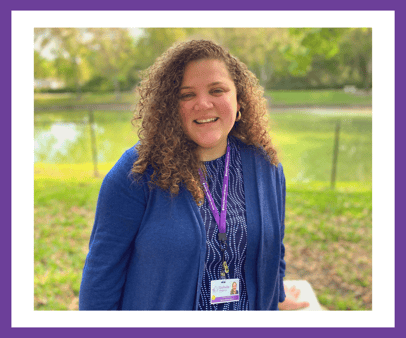6 min read
Meet the Team: Ashley Doers, Bereavement Counselor
By: Linda Ward on March 30, 2023 at 8:53 AM

The key to any company’s success is for its employees to work together seamlessly and have successful interdepartmental communications. A great way for that flow of conversation to begin is to get to know significant figures in our Gulfside community. Each month a different employee that has made a big difference at Gulfside will be chosen to be interviewed and featured in this blog. This month, we are happy to introduce one of Gulfside’s Bereavement Counselors, Ashley Doers.
Fun Facts
- Time at Gulfside: Started as an intern in 2022
- Position: Bereavement Counselor
- Favorite hobbies: International travel and scuba diving

Gulfside's service of bereavement counseling is a unique and special form of therapy that is designed to help individuals cope with the loss of a loved one. Gulfside's counselors provide a safe and supportive space for people to express their grief and explore ways to move forward in their lives. What makes bereavement counseling so special is the level of empathy, compassion, and understanding that the counselors bring to their work. They help clients navigate the complex emotions and challenges that come with loss, while providing practical strategies for coping and healing. By providing a non-judgmental and supportive environment, bereavement counselors can help clients find hope and meaning in the midst of their grief.
"A bereavement counselor is someone who needs to be comfortable with people going through discomfort."
Ashley Doers, one of Gulfside's bereavement counselors, works hard each day to to bring her compassionate spirit and energy to help provide comfort and peace to her clients.
"My role at Gulfside is a bereavement counselor and a typical day looks like providing individual counseling or helping to facilitate grief support groups. Those groups can be psycho-educational groups that teach someone the basis of what their grief is going to look like or they can be specialized grief support groups. I feel like the work at Gulfside has impacted me because it has shown me the vast need in the community for grief support, and how that impacts overall wellness and mental health"
A bereavement counselor has the privilege of seeing someone go through all the motions of grief. From denial to acceptance, a counselor is there to support the person through the journey.
"I’ve been able to see people here in our grief support groups who have felt they have gotten the support that they can't get anywhere else through Gulfside’s grief support. A lot of people have said they don’t have family close by or they feel like they don’t have people that they can share the depth of how they’re feeling, so they’re enjoying being with people that they feel like have been through something similar."
Grief is an unavoidable feeling that every person goes through at some point. Some people would describe grief as ever-present and pops up for unexplainable reasons or triggers. Ashley was asked if her past experiences with grief had affected her as a counselor, this is what she had to say:
"I’ve dealt with grief so much throughout my life. I’ve had my own grief experiences and my own bereavement experiences, in addition to also receiving grief support in the past. I’ve also have worked in behavioral health where clients have been dealing with the loss of loved ones through suicide or overdose. So prior to Gulfside I’ve worked in a field that dealt with complicated grief and loss. That has shaped my approach to grief counseling as well. My own mom passed four years ago, and in addition to that, so many other people. So I think I’ve done my own bereavement work myself. But mainly what shows my experience with grief counseling, is not that experience, it’s most times just from the work I have done in behavioral health and the other professional settings, I think they have been great skillsets along the way."
When dealing with people who have recently lost a loved one, bereavement counselors have to dip their toes in treacherous waters and find strategies to turn tsunamis of emotions into peaceful seas.
"Some strategies that I use in bereavement counseling to build an initial rapport with someone when we have individual sessions to let them know that they are really the expert in their own grief experience. What that looks like is making space for them to tell me about what their relationship was like with their loved one and asking questions about that relationship. I think it’s important to allow them space and time to talk about their loved one, saying the loved one’s name and recall memories and go through what that relationship was like. That is how we develop an understanding of that person’s relationship with someone, it’s how we build trust and how we begin to move into developing a plan of care."
"One of the best techniques that we use is that we remind people that their grief is like a thumbprint, everybody has one, but they’re all completely unique to a person. So just honoring that everyone’s grief experience and their relationship with the person that they lost is all different and unique. Talking with the client about if they’re feeling like they need individual sessions vs group support or a specialized group support. Determining what they need and why they’re there is really going to be best for them. We focus heavily on self-care and mindfulness and what those expressions of grief might look like. For self-care we talk to people about the physical symptoms grief can have in our bodies and also things they can do to take care of their hearts while they’re grieving."
The most effective way Gulfside's bereavement team serves the community is through the vast amounts of support groups and individual sessions.
"Though our support groups and individual sessions we will talk to clients about how they are coping with emotions. We just make space for them to express themselves in whatever ways they feel they need to. We provide confidentiality and a safe, respectful space though our support groups where people share from an “I” perspective, so they share their personal experiences and what is working for them. As bereavement counselors, we avoid advice and hold off on telling people how they should cope because that could look different for everyone. Once they express how they’re coping, we’ll work with them to see if that coping style is beneficial or not."
"Finding meaning and purpose is a major thing for people and it takes time."
"Yesterday in a grief support group we talked about this topic and a lot of people said they’re having a hard time finding a purpose and they’re just taking it day by day. Although some people have a very definitive answer to the question of “how do you find meaning and purpose after a loss” and their grief experience has made them feel like they have a new perspective on their life or they want to live their life to the fullest. People will have that mentality but also there are others that wont know what to do or how to find meaning."
Working each day with those going through such deep and complicated emotions can take a toll someone's mental health. Ashley shared her strategies as to how she keeps her peace even when speaking with people going through sad emotions.
"I am very careful about how I schedule my day. I will make sure that I’m scheduling a mix of individual sessions and group sessions each day, just to break things up. I will give myself a little space and time between each session to make sure that I can transition well to each patient and meeting each patient’s needs and completing appropriate documentation. We also lead groups that meet sometimes in the evening, so I am making sure we are not scheduling evening sessions every day. By having all of the different and diverse ways to assist clients, we are actually assisting ourselves too because it helps us to add more balance to our lives as clinicians also. I would say for myself when I leave work, I leave work here, and then I transition to my own personal life and my family, friends, support networks and interests and hobbies. I feel like what I get to do is such an honor and someone’s grief or mourning is something that I cannot fix. We ultimately don’t know what they’re feeling, but its just an honor just to sit with people and listen about what they’re going through. What we do here, grief and mourning, is something everyone has to go though, it is not a disorder so we just get to be here, in it and through it. There’s some times when there is more complicated grief and we use therapeutic approaches"
Gulfside bereavement counselors are trained to provide emotional support and guidance to individuals who are grieving the loss of a loved one. They can offer a safe and non-judgmental space for individuals to express their feelings, thoughts, and concerns related to the loss. Bereavement support groups can provide education and resources on the grieving process, as well as assist individuals in developing healthy coping strategies.
All of the bereavement services and support groups at Gulfside are offered free of charge to anyone in the community, even if they have not had a loved one receive Gulfside's care. We hope that this introduction of Ashley Doers can help you learn something new about Gulfside and the services we provide. For more information, visit www.GulfsideGrief.org or call 800-561-4883.
Related Posts
You’re Not Alone: Hospice Grief Services
Grief is a normal response to the losses and transitions of life. When someone important to us...
Celebrating Another Year Of Thrift Shopping And Supporting Pasco County
Gone are the days where fashion or antiques have to be expensive. For nearly 30 years, Gulfside...
Guide To Receiving Compassionate Care In 2022
What is the most important part of the end-of-life care process? Compassion. The National Institute...


